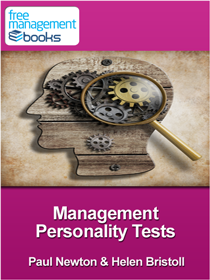Management Personality Tests - Free eBook in PDF Format
 |
 |
|
Book Description - ISBN 978-1-62620-782-0 (34 Pages)
This eBook explains how and why organizations use personality tests as part of their recruitment process. It describes how personality tests work and what aspects of your personality organizations are interested in measuring.
Chapter 1 - Management Personality Tests
Some organizations use personality tests as part of the job selection process. These tests attempt to measure various aspects of your personality in a quantitative way. The organization can then use this data in conjunction with the interview to make a (hopefully) better decision about your suitability for the job on offer. There is some debate as to whether or not it is possible to prepare yourself for personality tests, but understanding how personality tests are supposed to work can help you to make your own decision about this.
Chapter 2 - The 'Big 5' Aspects of Personality
The five factors that make up an individual's personality are Extraversion, Agreeableness, Conscientiousness, Neuroticism, and openness to experience. These traits exist on a continuum and everyone possesses all five to some degree. Each trait is made up of a number of facets.
Chapter 3 - Popular Personality Questionnaires
Personality questionnaires are usually used in conjunction with aptitude tests, interviews, and exercises to assess your ability to perform the role. The most common forms of personality questionnaires used in recruitment are: MBTI indicator, MMPI-2-RF, SHL OPQ32r, and the D.I.S.C. behavioral model.
Chapter 4 - Function and Validity Scales
Most personality questionnaires present you with between 50-200 questions and ask you to choose from two, five, or seven answers. The fact that many of the questions are open to wide interpretation is a fundamental problem with these tests. Test designers try to overcome this by asking the same thing in several different ways and then collating the answers, but there is very little evidence that this overcomes the problem. Validity questions are used to try to detect people 'faking' the test but these questions are fairly easy to spot. Academic psychologists tend to be skeptical of claims made by personality test providers regarding how useful these test actually are in predicting workplace performance.
Chapter 5 - Defining Your Work Personality
Most people modify their day-to-day behavior to suit the role or culture they are working in. This involves stepping outside of their natural behavioral preferences in order to get the job done. Always answer personality questionnaires from the perspective of your own 'work personality.' The extent to which you need to modify your answers depends on how dissimilar your work and home personalities need to be. Don't lie, but avoid raising 'red flags' that would result in you being rejected for roles that your track record and competencies show you are ideal for.
Chapter 6 - 'Make or Break' Questions
There are certain personality traits that every employer sees as desirable, including: honesty, integrity, self-motivation, and self-discipline. Extraversion is also seen as a desirable quality even if the role does not obviously demand it. Conversely, there are certain personality traits that every employer sees as undesirable, including: deceitfulness, inability to control anger, and inability to handle stress. Answering these questions 'wrongly' can result in you being rejected, because the questionnaires do not take account of mitigating circumstances. Impression control questions are designed to check for people 'faking' their answers. They use words such as 'always' or 'never,' where 'occasionally', 'very occasionally,' or 'usually' would be a more honest response.
How to Prepare for Personality Test - Despite the controversy surrounding some personality tests, there has been a dramatic increase in the use of personality tests over the past ten years or so. The single most frequently given reason for increases in testing is the need to have a selection process which can withstand legal challenges. Increased test use can therefore be seen in part as a defensive strategy, adopted in response to regulation and legislation. Another factor is the ease with which these tests can now be delivered online.
| You will learn: |
|


